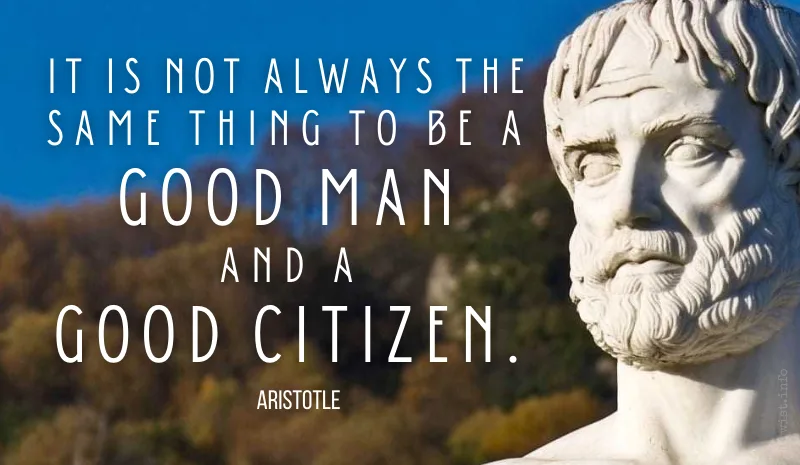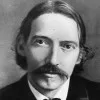For of course it is not always the same thing to be a good man and a good citizen.
[οὐ γὰρ ἴσως ταὐτὸν ἀνδρί τ᾽ ἀγαθῷ εἶναι καὶ πολίτῃ παντί.]
Aristotle (384-322 BC) Greek philosopher
Nicomachean Ethics [Ἠθικὰ Νικομάχεια], Book 5, ch. 2 (5.2.11) / 1130b.29 (c. 325 BC) [tr. Thomson (1953)]
(Source)
Aristotle suggests the distinction comes when a regime is corrupt or unjust, at which point carrying out the duties of a good citizen (supporting the regime) may not align with an individual's virtues.
See also Aristotle, Politics.
(Source (Greek)). Alternate translations:For perhaps it is not the same thing to be a good man, and a good citizen.
[tr. Taylor (1818), 5.2]It may be it is not the same thing to be a good man and a good citizen in every case.
[tr. Chase (1847), 5.4]The perfection of the man is not perhaps in all cases identical with the perfection of the citizens.
[tr. Williams (1869), 5.2]It is possibly not the same thing in all cases to be a good man and to be a good citizen.
[tr. Welldon (1892), 5.5]It is possible that to be a good man is not the same as to be a good citizen of any state whatever.
[tr. Peters (1893), 5.2]Perhaps it is not the same to be a good man and a good citizen of any state taken at random.
[tr. Ross (1908), 5.2]It would seem that to be a good man is not in every case the same thing as to be a good citizen.
[tr. Rackham (1934), 5.2.11]For being a good man is presumably not in every case the same as being a good citizen.
[tr. Reeve (1948)]For perhaps to be a good man is not the same as to be a good citizen in every case.
[tr. Apostle (1975)]Presumably it is not always the same thing to be a good man and a good citizen.
[tr. Thomson/Tredennick (1976)]For, presumably, being a good man is not the same as being every sort of good citizen.
[tr. Irwin/Fine (1995)]For, presumably, being a good person is not in every case the same as being a good citizen.
[tr. Crisp (2000)]For perhaps it is not the same thing in every case to be a good man and to be a good citizen.
[tr. Bartlett/Collins (2011)]
Quotations about:
good person
Note not all quotations have been tagged, so Search may find additional quotes on this topic.
To be honest, to be kind — to earn a little and to spend a little less, to make upon the whole a family happier for his presence, to renounce when that shall be necessary and not be embittered, to keep a few friends, but these without capitulation — above all, on the same grim condition, to keep friends with himself — here is a task for all that a man has of fortitude and delicacy. He has an ambitious soul who would ask more; he has a hopeful spirit who should look in such an enterprise to be successful.
Robert Louis Stevenson (1850-1894) Scottish essayist, novelist, poet
Essay (1888-12), “A Christmas Sermon,” sec. 1, Scribner’s Magazine, Vol. 4
(Source)
Originally written in the winter of 1887-88. Collected in Across the Plains, ch. 12 (1892).
To be a saint is the exception. To be a good man is the rule. Err, weaken and sin, but be among the good.
[Être un saint, c’est l’exception ; être un juste, c’est la règle. Errez, défaillez, péchez, mais soyez des justes.]Victor Hugo (1802-1885) French writer
Les Misérables, Part 1 “Fantine,” Book 1 “An Upright Man,” ch. 4 (1.1.4) (1862) [tr. Donougher (2013)]
(Source)
Part of the short summary of Bishop Myriel's teachings. (Source (French)). Alternate translations:To be a saint is the exception; to be upright is the rule. Err, falter, sin, but be upright.
[tr. Wilbour (1862); Wilbour / Fahnestock / MacAfee (1987)]To be a saint is the exception, to be a just man is the rule. Err, fail, sin, but be just.
[tr. Wraxall (1862)]To be a saint is the exception; to be an upright man is the rule. Err, fall, sin if you will, but be upright.
[tr. Hapgood (1887)]To be a saint is to be an exception; to be a true man is the rule. Err, fail, sin if you must, but be upright.
[tr. Denny (1976)]
Not every great man is a great human being.
[Nicht jeder große Mann is ein großer Mensch.]
Marie von Ebner-Eschenbach (1830-1916) Austrian writer
Aphorisms [Aphorismen], No. 267 (1880) [tr. Scrase/Mieder (1994)]
(Source)
(Source (German)). Alternate translation:Not every great man is a grand human being.
[tr. Wister (1883)]
If ’tis a happiness to be nobly Descended, ’tis no less to have so much Merit, that our Birth is the least thing considered in us.
[S’il est heureux d’avoir de la naissance, il ne l’est pas moins d’être tel qu’on ne s’informe plus si vous en avez.]
Jean de La Bruyère (1645-1696) French essayist, moralist
The Characters [Les Caractères], ch. 2 “Of Personal Merit [Du Mérite Personnel],” § 21 (2.21) (1688) [Bullord ed. (1696)]
(Source)
(Source (French)). Alternate translations:If 'tis a Happiness to be nobly descended, 'tis no less to have so much Merit, that no body inquires whether we are so or no.
[Curll ed. (1713)]If it is a Happiness to be nobly Descended it is not a less to have so much Merit, that no body enquires whether we are so or no.
[Browne ed. (1752)]If it be a happiness to be of noble parentage, it is no less so to possess so much merit that nobody inquires whether we are noble or plebeian.
[tr. Van Laun (1885)]A well-born man is fortunate, but so is the man about whom people no longer ask, is he well-born?
[tr. Stewart (1970)]
What is the goal of parenting? It’s to help a child grow up to be a decent human being, a mensch, a person with compassion, commitment, and caring.
Haim Ginott (1922-1973) Israeli-American school teacher, child psychologist, psychotherapist [b. Haim Ginzburg]
Between Parent and Child, ch. 10 “Summing Up” (2003 ed.) [with A. Ginott and H. W. Goddard]
(Source)
To an embalmer there are no good men and bad men. There are only dead men and live men.
H. L. Mencken (1880-1956) American writer and journalist [Henry Lewis Mencken]
A Little Book in C Major, ch. 4, § 15 (1916)
(Source)
“Let your conscience be your guide” is a silly thing to say to a good man, or a bad one.
Mignon McLaughlin (1913-1983) American journalist and author
The Second Neurotic’s Notebook, ch. 5 (1966)
(Source)
While then the worst man is he who displays vice both in his own affairs and in his dealings with his friends, the best man is not he who displays virtue in his own affairs merely, but he who displays virtue towards others; for this is the hard thing to do.
[κάκιστος μὲν οὖν ὁ καὶ πρὸς αὑτὸν καὶ πρὸς τοὺς φίλους χρώμενος τῇ μοχθηρίᾳ, ἄριστος δ᾽ οὐχ ὁ πρὸς αὑτὸν τῇ ἀρετῇ ἀλλὰ πρὸς ἕτερον: τοῦτο γὰρ ἔργον χαλεπόν.]
Aristotle (384-322 BC) Greek philosopher
Nicomachean Ethics [Ἠθικὰ Νικομάχεια], Book 5, ch. 1 (5.1.18) / 1130a.5-8 (c. 325 BC) [tr. Peters (1893)]
(Source)
(Source (Greek)). Alternate translations:Now he is the basest of men who practises vice not only in his own person, but towards his friends also; but he the best who practises virtue not merely in his own person but towards his neighbour, for this is a matter of some difficulty.
tr. Chase (1847), ch. 2]Worst of men is he whose wickedness affects not himself alone but his fellow with him; best of men is he whose virtue affects not himself alone but his fellow with him; for such a one has in all sooth a hard task.
[tr. Williams (1869)]As then the worst of men is he who exhibits his depravity both in his own life and in relation to his friends, the best of men is he who exhibits his virtue not in his own life only but in relation to others; for this is a difficult task.
[tr. Welldon (1892)]Now the worst man is he who exercises his wickedness both towards himself and towards his friends, and the best man is not he who exercises his virtue towards himself but he who exercises it towards another; for this is a difficult task.
[tr. Ross (1908)]As then the worst man is he who practises vice towards his friends as well as in regard to himself, so the best is not he who practises virtue in regard to himself but he who practises it towards others; for that is a difficult task.
[tr. Rackham (1934)]The worst sort of person, then, is the one who uses his depravity both in relation to himself and in relation to his friends, whereas the best sort is not the one who uses his virtue in relationship to himself but the one who uses it in relation to another person, since that is difficult work.
[tr. Reeve (1948)]The worst man, then, is the one whose evil habit affects both himself and his friends, while the best man is one whose virtue is directed not to himself, but to others, for this is a difficult task.
[tr. Apostle (1975)]So the worst person is the one who exercises his wickedness towards both himself and his friends, and the best is not the one who exercises his virtue towards himself but the one who exercises it towards another; because this is a difficult task.
[tr. Thomson/Tredennick (1976)]So the worst person is the one who exercises wickedness in relation to himself and in relation to his friends, and the best is not he who exercises his virtue in relation to himself but the one who exercises it in relation to others, since this is a difficult thing to do.
[tr. Crisp (2000)]Worst, then, is he who treats both himself and his friends in a corrupt way, but best is he who makes use of virtue not in relation to himself but in relation to another. For this is a difficult task.
[tr. Bartlett/Collins (2011)]
Charming villains have always had a decided social advantage over well-meaning people who chew with their mouths open.
Judith Martin (b. 1938) American author, journalist, etiquette expert [a.k.a. Miss Manners]
Common Courtesy, “In the Quest for Equality, Civilization Itself Is Maligned” (1985)
(Source)
Originally published in The New Republic in 1984.
Something Vimes had learned as a young guard drifted up from memory. If you have to look along the shaft of an arrow from the wrong end, if a man has you entirely at his mercy, then hope like hell that man is an evil man. Because the evil like power, power over people, and they want to see you in fear. They want you to know you’re going to die. So they’ll talk. They’ll gloat.
They’ll watch you squirm. They’ll put off the moment of murder like another man will put off a good cigar.
So hope like hell your captor is an evil man. A good man will kill you with hardly a word.
Hence we see good men in all religions, and as many in one as another. It is then a matter of principle with me to avoid disturbing the tranquility of others by the expression of any opinion on the innocent questions on which we schismatize, & think it enough to hold fast to those moral precepts which are of the essence of Christianity, & of all other religions. No where are these to be found in greater purity than in the discourses of the great reformer of religion whom we follow.
Thomas Jefferson (1743-1826) American political philosopher, polymath, statesman, US President (1801-09)
Letter to James Fishback [draft] (27 Sep 1809)
(Source)
In the final version of the letter, this passage read:We all agree in the obligation of the moral precepts of Jesus, & no where will they be found delivered in greater purity than in his discourses. it is then a matter of principle with me to avoid disturbing the tranquility of others by the expression of any opinion on the innocent questions on which we schismatise.
The noblest question in the world is, What Good may I do in it?
Benjamin Franklin (1706-1790) American statesman, scientist, philosopher, aphorist
Poor Richard (1737 ed.)
(Source)
Make it thy chief Design and thy great Business, not to be Rich and Great: but so to live in this World that thou mayest reasonably believe thou has God for thy Friend.
Thomas Fuller (1654-1734) English physician, preacher, aphorist, writer
Introductio ad Prudentiam, Vol. 1, # 939 (1725)
(Source)
HENRY: A speaker is but a prater, a rhyme is but a ballad, a good leg will fall, a straight back will stoop, a black beard will turn white, a curled pate will grow bald, a fair face will wither, a full eye will wax hollow, but a good heart, Kate, is the sun and the moon, or rather the sun and not the moon, for it shines bright and never changes but keeps his course truly. If thou would have such a one, take me.
There is an idea abroad among moral people that they should make their neighbors good. One person I have to make good: myself.
Robert Louis Stevenson (1850-1894) Scottish essayist, novelist, poet
Essay (1888-12), “A Christmas Sermon,” sec. 2, Scribner’s Magazine, Vol. 4
(Source)
Originally written in the winter of 1887-88. Collected in Across the Plains, ch. 12 (1892).
The old woman took the umbrella, gratefully, and smiled her thanks. “You’ve a good heart,” she told him. “Sometimes that’s enough to see you safe wherever you go.” Then she shook her head. “But mostly, it’s not.”
I have always found that so-called bad people gain in one’s estimation when one gets to know them better, and good people decline.
Georg C. Lichtenberg (1742-1799) German physicist, writer
Aphorisms, Notebook G, #25 (1779-83) [tr. Hollingdale (1990)]
(Source)
To be thoroughly good-natured, and yet avoid being imposed upon, shows great strength ov character.
Josh Billings (1818-1885) American humorist, aphorist [pseud. of Henry Wheeler Shaw]
Everybody’s Friend, Or; Josh Billing’s Encyclopedia and Proverbial Philosophy of Wit and Humor, ch. 157 “Affurisms: Hot Korn” (1874)
(Source)
It is manifestly possible to be a good citizen without possessing the goodness that constitutes a good man.
[ὅτι μὲν οὖν ἐνδέχεται πολίτην ὄντα σπουδαῖον μὴ κεκτῆσθαι τὴν ἀρετὴν καθ᾽ ἣν σπουδαῖος ἀνήρ, φανερόν.]
Aristotle (384-322 BC) Greek philosopher
Politics [Πολιτικά], Book 3, ch. 4 / 1276b.34 [tr. Rackham (1932)]
(Source)
Note that a similar passage can be found at 1277a12.
(Source (Greek)). Alternate translations:An excellent citizen does not possess that virtue which constitutes a good man.
[tr. Ellis (1776)]It is quite possible that a citizen, though good as such, should not possess the excellence which characterizes a the good man.
[tr. Bolland (1877)]The good citizen need not of necessity possess the virtue which makes a good man.
[tr. Jowett (1885)]That it is possible for a citizen to be excellent yet not possess the virtue in accordance with which he is an excellent man, therefore, is evident.
[tr. Lord (1984)]Evidently, then, it is possible to be a good citizen without having acquired the virtue expressed by a good man.
[tr. Reeve (1998)]


















